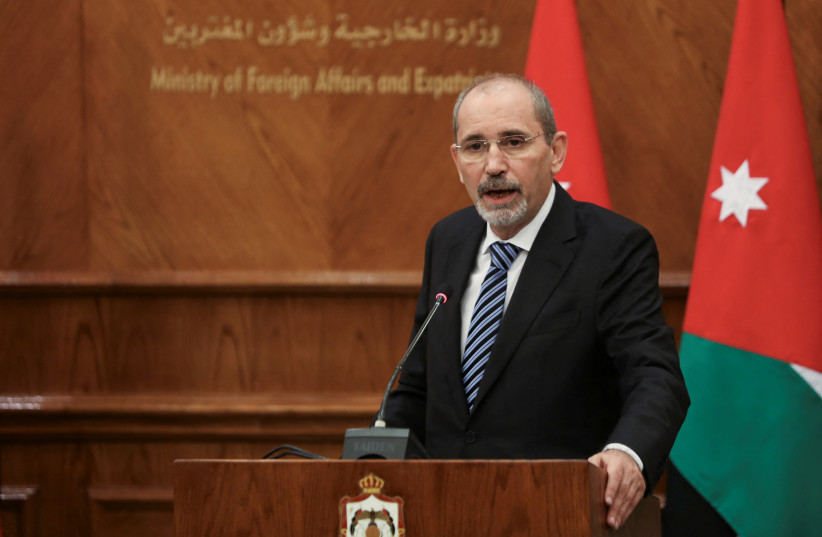The country of Jordan has played a leading role in reflecting the Arab point of view throughout the current Israel-Hamas war and will most certainly play a role in any talks about the future of the Palestinian territories after the conflict ends.
For more stories from The Media Line go to themedialine.org
Jordan has an excellent relationship with the Palestinian Authority leadership based in Ramallah, and international actors will certainly look to it to advise as to what would work and what would not work.
Jordan’s only drawback currently is that it has not abandoned any serious negotiations with the Hamas movement. Jordan deported Hamas officials in 1998 and has not allowed them to set up office or to have any presence in Jordan. For the time being, the Hamas portfolio might continue to be handled by Egypt. At the same time, Jordan will be expected to coordinate its position with Palestinian Authority President Mahmoud Abbas and his team.
The Media Line contacted several leading Jordanians, who agree that Amman can play a role in the current events and talks. Jordan's strong relationship with the United States and the fact that it was the second Arab country to sign a peace treaty with Israel are important assets. The withdrawal of the Jordanian ambassador from Israel following the outbreak of the current war and the denial of the Israeli ambassador's return to Jordan are unlikely to hurt Jordan’s efforts. Analysts point to the strong relations Jordan’s military continues to have with the Israeli military and the fact that Jordan continues to carry out aid drops in Gaza and has established a second military field hospital as testifying to this strong relationship.
Mohammad Momani, a former deputy prime minister of Jordan, told The Media Line that regardless of any ideas circulating about the future of Gaza, Jordan is indispensable for any resolution of the conflict.

“It is important that Jordan’s wisdom and Jordan’s vision be on any table of discussion on any issues. I think that the vision of the two-state solution that Jordan keeps fighting for is the logical and most appropriate outcome of this conflict,” he said.
Jamil Nimri, a member of the Jordanian Senate and head of the Social Democratic Party politburo, told The Media Line that Jordan's earlier pronouncement that it was not willing to discuss "the day after" was an initial position held by both Jordan and Egypt while the war was continuing and no one knew what would happen next.
“Jordan will be happy to talk about the cease-fire in parallel to a political solution, and not about any temporary solution like who would govern Gaza after Hamas. This is not a possibility unless people think Israel can succeed in fully occupying Gaza, which would be a very dangerous development," he said.
Nimri conceded that if an international force was deployed as a temporary measure to protect Palestinians in both the West Bank and Gaza until elections and negotiations for a permanent solution could be held, this would be acceptable if it was done in coordination with the Palestinians.
Haytham Ereifej, a Jordanian attorney and political activist who is a founding member of new political party Azem, told The Media Line that Jordan’s central and strategic role in the Arab-Israeli conflict cannot be ignored.
'The Palestinian issue is deeply ingrained in Jordan'
“The Palestinian issue is deeply ingrained in Jordan and the Jordanian effects, especially on decision-makers in Ramallah, is obvious,” Ereifej said. He said that Jordan's strategic location makes it a bridge for any future economic cooperation with Gulf states, and added that while the future may seem dark, Jordanians believe in the Arab proverb, “If people want to live, destiny will respond.”
Ahmad Awad, director of Jordan's Phenix Center for Economics and Infomatics Studies and a former director of Palestinian refugee camps in Jordan, told The Media Line that the Palestinian-Israeli conflict has been going on for 80 years and that even if Israel destroys Gaza and continues committing "war crimes," the conflict will not stop.
“Any solution must be deep and must be based on international law and UN resolutions and the need for Israel to end its occupation and its war crimes," he said. "Any other suggestion will not reach the level of ending the conflict and the end of the war and every month or year we will see a return to the fighting. Look what is happening in the West Bank."
Awad said that Americans need to know that there will not be peace, no stability, and no protection of their interests without a return to the root causes of the conflict and a resolution according to international law.
“Any negotiations or efforts to find solutions without the participation of the key parties to the conflict, who are the Palestinians representing all their representatives, [will fail]," he said. "We cannot say that the Palestinian Authority has no role, nor can we say Hamas has no role. Jordan is a major player, regardless of whether it has a strong or not-so-strong relationship with Hamas. I think that the Americans will pay attention very closely to what Jordan has to say.”
